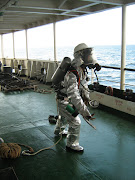The topic was taken from Telegraph Volume 43 Number 07 edition July 2010.
Union welcomes mounting pressure for the industry to clean up its act by embracing the 'fuel of the future'.
Nautilus has welcomed a new drive by classification societies to encourage shipowners to adopt LNG as the fuel for the future .
Switching from heavy fuel oil (HFO) will not only be good for the environment, they say, but also good for business - with a study published by DNV last month forecasting savings of up to 45% over a 20-years period.
The French classification society Bureau Veritas also urged the industry to adopt LNG as a means of reducing harmful emissions. 'Shipowners and shipyards will need to be more imaginative and to find new ways to reduce air pollution,' 'NG power for ships reduces NOx emissions by 80-90%, eliminates SOx emissions, reduce particulate matters close to zero and cuts by 20-25%.
BV said it is already working on a number of project involving gas or dual gas / fuel oil for a range container ships, cruse vessel, ferries, ro-pax and ro-ros, as well as inland and coastal navigation ships. The society is also assessing the viability of refitting existing ships.
'Technical solutions to install gas fuel engines in various types of vessels are already in place, demonstrating the feasibility of this alternative to liquid fuels'. 'The hurdles we now have to overcome involve the bunkering storage and supply of NG to non-LNG carriers. Finding space for LNG tanks, for heating and cooling equipment, and for protection against spillage are all tasks we have in hand'.
'The results will be a step change in the cleanliness of shipping'. 'Today's ships burn the dirtiest fuel that is available. Gas powered ship will burn the cleanest. That is worth working for'.
The dutch flagged Coral Methane, is the world's first 'dual-fuel' combined LNG/ethylene/LPG carrier. Delivered the Dutch owner Anthony Veder last year, the 7,500 cum capacity vessel runs off LNG cargo boil-off gas when carrying LNG. In this mode, the ship emits 100% less sulphur oxide and particulate matter, and 92% less Nox and 25% less CO2 than when burning fuel Oil.
sea service Authority is leading Denmark is also spearheading moves to promote LNG - particularly for vessels operating shorts in the Baltic, English Channel and North Sea regions. The Danish Maritimea project to examine the feasibility of establishing a chain of LNG 'filling stations' for ships in the area.
The study is also looking at safety and technical issues, including seafarer training.
trNautilus senior national secretary commented 'Shipping is, and will remain, the dirtiest form ofansport as long as it continues to use HFO - the waste product of the refining process. The dangers to people living in port areas are well-documented and the health of seafarers continues to be put at risk.
'For sound environmental and economic reasons, it makes, sense to discontinue using HFO,' In Europe have
-





















